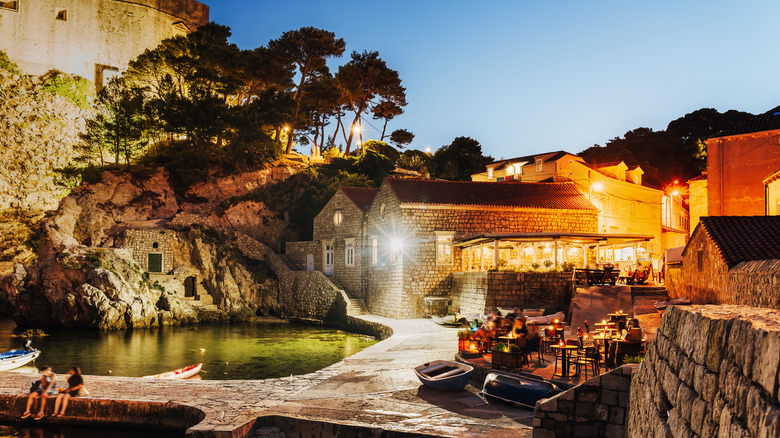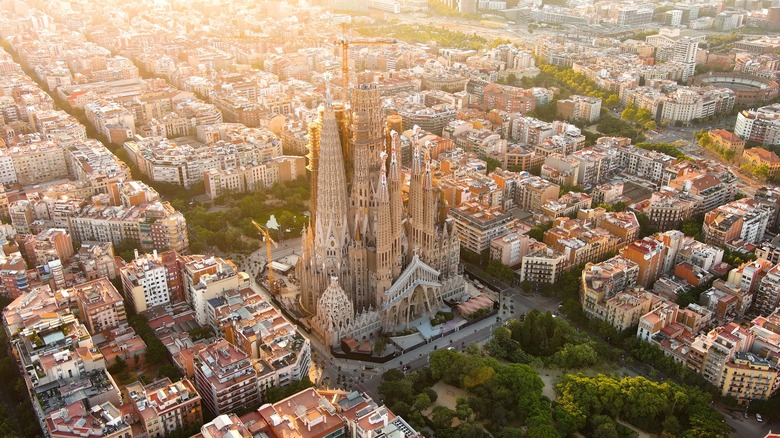Tourism Taxes Are Extremely High In These Two European Cities
Even in the exciting and adventurous world of travel, one thing is certain — taxes. Europe's enchanting cities have long beckoned travelers with their rich history, stunning architecture, and vibrant culture. However, with the massive influx of tourists over the years and the increased popularity of day-trippers, some cities have had to reconsider their approach to tourism management. Topping the list with their heightened tourism taxes are two of Europe's most popular destinations: Dubrovnik and Barcelona.
As a traveler, it is important to be aware of the different types of taxes. There are per diem, accommodation, arrival and departure, value-added taxes (VAT), green taxes, and other more specific types of taxes. Ultimately, tourist taxes are set in place to raise funds to help mitigate the effects of over-tourism and, in turn, sustainably reduce visitor numbers. In prime destinations, such as Barcelona and Dubrovnik, locals are undoubtedly affected — higher costs of living, strained public services, noise pollution, overcrowding, and luggage banging relentlessly along cobblestone streets. Not to mention the impact of hundreds of thousands of people going in and out on a daily basis.
These various tourism taxes are used for environmental conservation, preservation, maintenance of public spaces, and other essential municipal investments. Good for the locals and the environment, but maybe not for the travelers' wallets. Before you set sail or flight for your destination, account for tourism taxes in your budget. View them as an opportunity — instead of merely taking from tourism, you have a chance to give back.
Taxing times: Dubrovnik and Barcelona's approach
Dubrovnik, often referred to as the "Pearl of the Adriatic," boasts medieval walls, historic buildings, and a picturesque coastline that has caught the fancy of travelers and film crews alike. Popularized by HBO's 'Game of Thrones,' this Croatian city has seen a surge in its visitor count, leading to concerns about over-tourism. In fact, Dubrovnik has the highest ratio of tourists per resident in all of Europe, a staggering 36 to 1. To manage this, Dubrovnik introduced higher tourism taxes as a part of its broader strategy to control and limit the daily number of visitors, especially those from cruise ships. Expect an accommodation tax of €2.65 per individual per night from April to September, reduced to €1.86 for the remainder of the year.
Barcelona follows suit. With its unique blend of Gothic and Modernist architecture and, of course, vibrant street life, Barcelona has become the most visited city in Spain for over a decade. However, with its popularity came challenges such as overcrowded landmarks and rising living costs for locals. To address these, the city of Barcelona imposed elevated tourism taxes, mainly targeting accommodation. Hotel stays, vacation apartment rentals, and even cruise ship dockings now come with heftier price tags. Expect an accommodation tax of €4 per night, an additional city surcharge tax of €3.25, and a nightly cruise passenger tax of €3. For guests staying in five-star hotels, the fees are higher — €5.25 per night, amounting to nearly €40 a week.
The vision for a sustainable future
The European Union as a whole, of which both Dubrovnik and Barcelona are a part, is introducing a total tourist tax of €7, applying to all non-EU citizens between the ages of 18 and 70. Europe is the most visited region of the world, with nearly half a billion international tourist arrivals per year. This new initiative is going to be instrumental in taking care of beloved monuments, preserving the environment, and sharing the costs of being somewhere special.
Although the Cathedral of Barcelona, Park Güell, Fort Lovrijenac, and the Dubrovnik City Walls are made of stone, they still have to be maintained. So, even though these measures might increase travel budgets in the short term, the long-term vision is to ensure Barcelona and Dubrovnik remain enchanting and in good shape for generations to come. The decision to increase tourism taxes in these cities has been a calculated one, and there may be additional increases in years to come. City officials are working to strike a balance between promoting tourism — a significant revenue source — and preserving the very essence and charm that attract people to these places.
For travelers, this serves as a gentle reminder that traveling is not just about exploration but also about respect and contribution to the places visited. As the saying goes, "Take only memories, leave only footprints." In the case of Dubrovnik and Barcelona, those footprints come with a slightly higher price tag, but for a worthy cause.


